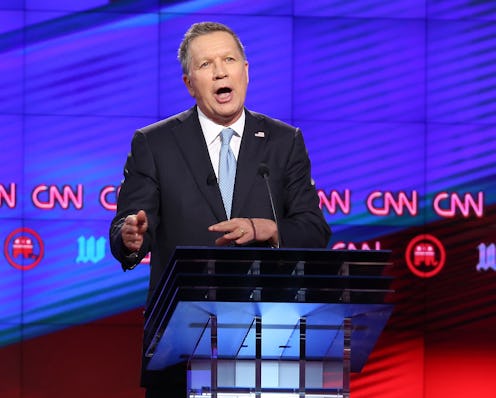News
What If No One Wins The Most Delegates?
As you may have noticed, Donald Trump has been dominating the Republican primary for president, and fear has spread throughout the GOP establishment that he might actually become the party's nominee. If he ends up winning the majority of delegates, there's not much anyone can do per the party's rules. But what if no candidate wins a majority of delegates?
If that happens, the result will be the Holy Grail of politics: a contested convention! That hasn't happened since 1952, and if it happens in 2016, all 2,472 Republican delegates will be free to vote for whoever they want at the nominating convention, regardless of how their states voted. That, in turn, will result in utter chaos on the convention floor, as candidates and their campaigns frantically lobby every delegate they can in an attempt to cobble together a majority and win the nomination. But let's back up a bit.
Republican National Committee rules state that a candidate must win a majority of delegates to become the nominee. This year, that means they have to win 1,237 delegates. Here's how many delegates each of the remaining candidates have, as of Monday, March 14:
- Donald Trump: 460
- Ted Cruz: 369
- Marco Rubio: 163
- John Kasich: 63
Delegate allocation rules are super complicated, as they vary by state and depend in part on the vote share in individual congressional districts. According to a recent POLITICO report, however, Cruz, Trump's nearest rival, would still need to win around 70 percent of the remaining delegates in order to hit the magic number of 1,237, and Rubio likely even more so, as he has earned more than 200 delegates less than Cruz. Given both candidates' generally underwhelming performance thus far, that's a pretty steep uphill climb. The probability of Kasich pulling off this feat is almost zero, given that he hasn't won a single state so far.
This means the most feasible way of stopping Trump isn't to reach a majority of delegates, but rather to prevent Trump from winning a majority of delegates and force a contested convention. This is why, for example, Rubio is telling his Ohio supporters to vote for Kasich instead of him. The Florida senator realizes that, while he himself has no chance of winning the Ohio primary, Kasich does, and so it's better to boost Kasich's vote share in the state in the hopes of preventing Trump from coming in first.
If this strategy succeeds — not just in Ohio, but in the rest of the remaining states — and Trump doesn't reach 1,237 delegates, then Republicans will have a contested convention. All of the Republicans delegates will vote to nominate a candidate, but because no candidate will have won a majority, the vote will be inconclusive.
And at that point, all hell will break loose. After the first round of voting, the vast majority of delegates will be free to support whichever candidate they want. (Delegate rules differ by state. In most states, however, delegates become "unbound," and can thus vote for whomever they please, after the first round of voting.) Needless to say, this gives each one of the 2,472 Republican delegates enormous power in determining the party's eventual nominee. This could play out in any number of ways, but the result will very likely be a mad scramble on the floor of the convention, with chaotic last-minute wheeling and dealing between the delegates and the campaigns.
It's far too soon to say who would become the eventual nominee at a brokered convention. One thing is fairly certain, though: It will make for great TV.
